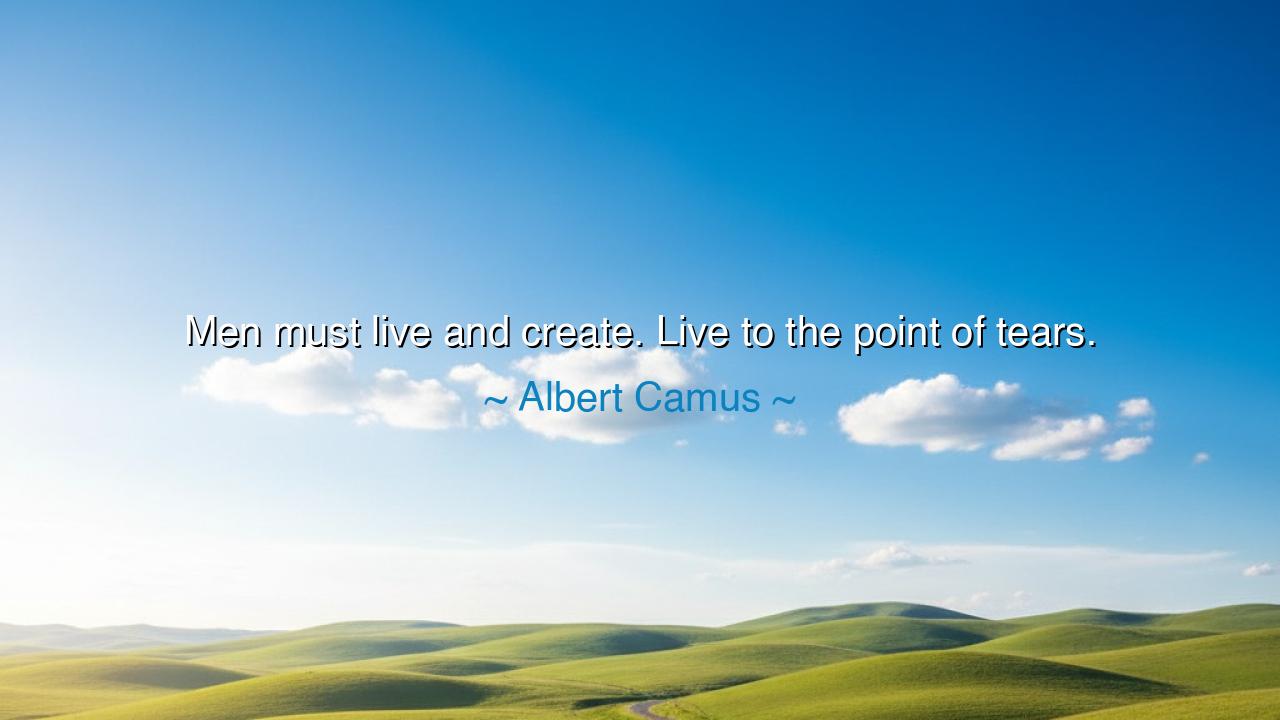
Men must live and create. Live to the point of tears.






“Men must live and create. Live to the point of tears.”
Thus spoke Albert Camus, the philosopher of light and shadow, whose heart was both wounded by the world’s sorrow and lifted by its beauty. These words rise from the depths of the human condition — from the endless tension between despair and defiance, between the absurdity of life and the courage to live it anyway. To live and create, he says, is not merely to survive or to exist, but to pour one’s whole being into the act of living — to feel so deeply that life itself moves one to tears. For tears, whether born of joy or grief, are the purest proof that the soul is awake.
Camus wrote in an age when the world was bleeding — amid wars, occupations, and shattered ideals. He had seen men die for empty causes, and others drift through life untouched by meaning. Out of that desolation came his call: that man must live, not in numb acceptance, but in passionate rebellion against emptiness. To create was to build meaning where none was given, to carve beauty out of chaos. Thus, when he said to “live to the point of tears,” he meant to live fully — to feel life’s sweetness and sorrow so intensely that it breaks the heart open, not in despair, but in wonder.
This teaching is not a soft one. It demands that we face the pain of existence and yet refuse to turn away. To live is to embrace both joy and suffering, and to create is to transform both into something greater. The artist paints despite anguish; the mother loves though she knows loss; the dreamer strives though the world mocks his vision. Camus believed that meaning is not found — it is made. Each act of creation, each gesture of love, each honest tear is a defiance of the void. Through such defiance, man becomes noble.
Think of Vincent van Gogh, who lived in torment yet never ceased to paint. His days were filled with loneliness, his nights haunted by madness, but his brush burned with light. Each stroke was an act of rebellion against despair, a cry of faith in beauty even when beauty seemed lost. He painted fields of gold and skies aflame — visions of hope wrung from suffering. He lived and created to the point of tears, and though the world did not understand him, his art became immortal. Through his pain, he revealed the same truth that Camus spoke: that to live deeply is to create meaning through feeling.
But this call is not only for artists. It belongs to all who dare to feel. To the teacher who believes in her students when the world has forgotten them. To the father who rises each morning despite his burdens, shaping love from duty. To the wanderer who looks upon the sunset and feels, for one fleeting instant, the ache of beauty that words cannot hold. In such moments, when the heart trembles and the eyes fill with tears, we touch the divine pulse of life — and know that we are truly alive.
Camus did not ask men to seek perfection, nor to chase happiness without end. He asked them to be awake — to live consciously, courageously, and creatively. The world may be absurd, its purposes unclear, but we are not powerless. Our power lies in creation — in making something honest and beautiful from the raw material of existence. To live to the point of tears is to live so authentically that one’s soul stands naked before the truth of life, unafraid of its splendor or its sorrow.
So remember this, O seeker of meaning: Do not flee from feeling. Let life move you. Laugh deeply, weep openly, love fiercely, and create boldly. Do not live as a spectator in your own days — live as one who shapes them with your hands and heart. Build, write, sing, plant, forgive. Let every day bear the mark of your creation. For it is only when we live and create to the point of tears that we taste what it truly means to be human — fragile, flawed, yet magnificent in our defiance of the dark.
Thus, as Camus would have us know: to live fully is itself the greatest art.






AAdministratorAdministrator
Welcome, honored guests. Please leave a comment, we will respond soon